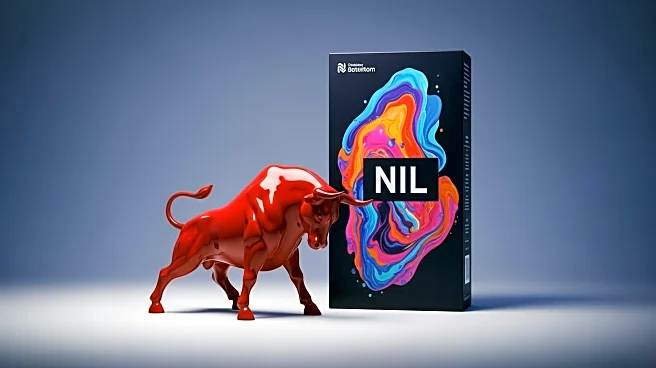What's Happening?
Jeremiah Smith, a star wide receiver for Ohio State, has signed a groundbreaking Name, Image, and Likeness (NIL) deal with Red Bull, becoming the first college athlete to appear on a Red Bull can. Smith's
NIL valuation is reported to be $4.2 million, making him one of the highest-valued college athletes. This partnership adds to Smith's extensive list of NIL deals, which includes brands like Adidas, EA Sports, 7-Eleven, and Nintendo. Smith's impressive performance in his freshman year, where he accumulated 1,315 yards and 15 touchdowns, has made him a sought-after figure in college sports marketing.
Why It's Important?
Smith's NIL deal with Red Bull signifies a major shift in college sports marketing, highlighting the growing influence and financial opportunities for college athletes. This development underscores the increasing importance of NIL agreements in shaping the careers and public profiles of young athletes. With Smith's high valuation, brands are recognizing the potential of college athletes to drive consumer engagement and brand visibility. This trend could lead to more lucrative opportunities for athletes beyond traditional sports endorsements, impacting how college sports are commercialized.
What's Next?
As Smith continues to excel on the field, his marketability is likely to increase, potentially leading to more high-profile endorsements. His performance this season, with 602 receiving yards and seven touchdowns, suggests he will remain a key player for Ohio State. The success of his NIL deals may encourage other athletes to pursue similar opportunities, further transforming the landscape of college sports marketing. Additionally, Smith's future prospects in professional sports could be influenced by his established brand partnerships.
Beyond the Headlines
Smith's NIL deal raises questions about the ethical implications of commercializing college athletes. While these agreements provide financial benefits, they also introduce pressures related to brand representation and public image management. The long-term impact on athletes' careers and personal lives remains a topic of discussion, as the balance between sports performance and commercial obligations becomes increasingly complex.










